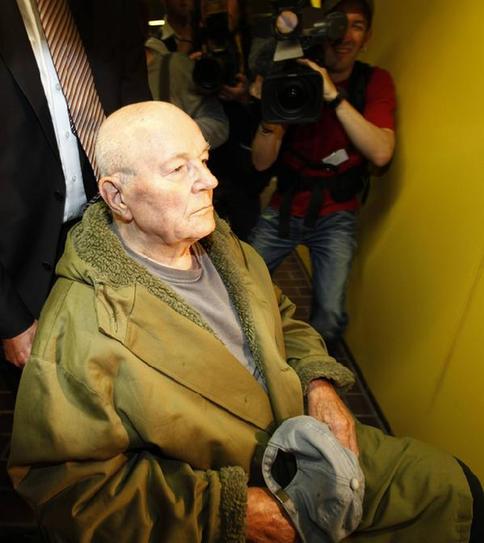Politics
Demjanjuk convicted over Nazi camp deaths
Updated: 2011-05-13 10:04
(Agencies)
MUNICH - A German court convicted retired US autoworker John Demjanjuk on Thursday of taking part in the murder of tens of thousands of Jews as a Nazi death camp guard, breaking legal ground that could pave the way for the prosecution of many low-level cogs in Hitler's machinery of destruction.
The 91-year-old Demjanjuk was sentenced to five years in prison on 28,060 counts of accessory to murder - one each for the number of people killed at the Sobibor death camp during the six months in 1943 when he was convicted of standing guard there.
 |
|
Accused Nazi death camp guard John Demjanjuk leaves a courtroom after his the verdict in Munich on May 12, 2011. Convicted Nazi camp guard John Demjanjuk, 91, will be released from jail despite his five-year sentence for helping to kill 27,900 Jews at the Nazi death camp Sobibor because of his advanced age, the court said. [pHOTO/aGENCIES] |
But Demjanjuk will spend no immediate time behind bars. Presiding Judge Ralph Alt ordered him released from custody pending his appeal - a process that could take at least a year. It was not immediately clear when Demjanjuk would be released or where he would go.
The case was considered groundbreaking because although scores of Nazi war criminals have been tried and convicted in Germany, in this case there was no evidence that Demjanjuk (dem-YAHN'-yuk) committed a specific crime.
His prosecution was based on the theory that if Demjanjuk was at the camp in Nazi-occupied Poland, he was a participant in the killing there - the first time such a legal argument has been made in German courts.
"This case is a door opener," said Thomas Walther, a former federal prosecutor who led the investigation that prompted Germany to put Demjanjuk on trial.
The Ukrainian-born Demjanjuk was a Soviet Red Army soldier captured by the Germans in Crimea in 1942. He is accused of then agreeing to serve as a "Wachmann," or guard, the lowest rank of the "Hilfswillige," former POWs who were subordinate to German SS men.
Walther said his office has many cases that have been investigated but shelved and could now be reopened. Although it's hard to say how many living suspects might fall into the same category as Demjanjuk, it could be hundreds or more, Walther said.
"It could be very soon that more are brought to the table," he told The Associated Press.
The prospect of Demjanjuk's release pending appeal, though common under the German justice system, drew immediate ire from those who had been pushing for his conviction.
"We don't think that that's appropriate given the heinous nature of his crimes," Efraim Zuroff, the chief Nazi hunter at the Simon Wiesenthal Center, said in a telephone interview from Jerusalem.
Still, Zuroff called the conviction "a very important victory for justice."
"The verdict sends a very powerful message that even many years after the crimes of the Holocaust, the perpetrators can be brought to justice," he said. "We're hopeful that this verdict will pave the way for additional prosecutions in Germany."
Demjanjuk attorney Ulrich Busch said he was appealing the decision and expressed confidence he would succeed. Demjanjuk "will not see one day in jail," he said.
Alt said Demjanjuk did not pose a flight risk because of his age, poor health and the fact that he is stateless after being deported from the US two years ago.
That meant there were no grounds to hold him, Alt said. "It's the law, and so it's justice," he told the AP. "I say he's guilty, but it's not a final verdict."
Demjanjuk's son, John Demjanjuk Jr., said his father needs daily medical attention and would likely need to be moved into an assisted care facility - the costs of which would be paid by the German government.
"We're in the planning stage and I can't say where he's going to go," he told the AP in a telephone interview from Ohio.
Still, he said he was relieved by the decision to free his father "because he has never deserved to sit in prison for one minute."
The younger Demjanjuk said he planned to visit his father, though he was not sure when. Demjanjuk's 85-year-old wife, Vera, is in poor health and unable to travel.
In handing down the court's ruling, Alt called Demjanjuk a piece of the Nazis' "machinery of destruction."
"The court is convinced that the defendant ... served as a guard at Sobibor from 27 March 1943 to mid-September 1943," Alt said, referring to a period when the Nazi genocide machine was operating at full force.
Demjanjuk sat in a wheelchair in front of the judges as they announced their verdict after the nearly 18-month trial, but showed no reaction. He has denied the charges but declined the opportunity to make a final statement to the court.
Integral to the prosecution's case was an SS identity card that allegedly shows a picture of a young Demjanjuk and indicates he trained at the SS Trawniki camp and was posted to Sobibor.
Though court experts said the card appears genuine, the defense maintains it is a fake produced by the Soviet KGB.
The US Department of Justice's Office of Special Investigations also has said the card is genuine, but documents recently unearthed by the AP indicate the FBI at one time had doubts similar to those aired by Demjanjuk's defense - though the material was never turned over to his attorneys.
Alt noted that in addition to the card the court found other credible evidence, including transfer lists indicating a guard named Demjanjuk with the same Trawniki number was sent to serve in Sobibor and elsewhere.
Rudolf Salomon Cortissos, whose mother was gassed at Sobibor along with thousands of other Dutch Jews, cried softly in a back row of the courtroom, wiping his tears with a white handkerchief, as Alt somberly read out the names of his mother and others who were killed in the death camp.
"It's very emotional. It doesn't happen every day," he said, adding that he was happy with the verdict and sentence. "For me it is satisfying."
Vera John de Jong of Belgium, whose parents were gassed in Sobibor, was stoic about the decision to release Demjanjuk for the time being.
"He's been convicted, and that's what is important," she told AP. "He was probably better off in prison than he will be now."
Specials

Sino-US Dialogue
China and the US hold the third round of the Strategic and Economic Dialogue from May 9-10 in Washington.

New wave
Coastal city banks on marine sector to ride next stage of economic development

V-Day parade
A military parade marking the 66th anniversary of the Soviet victory over Nazi.